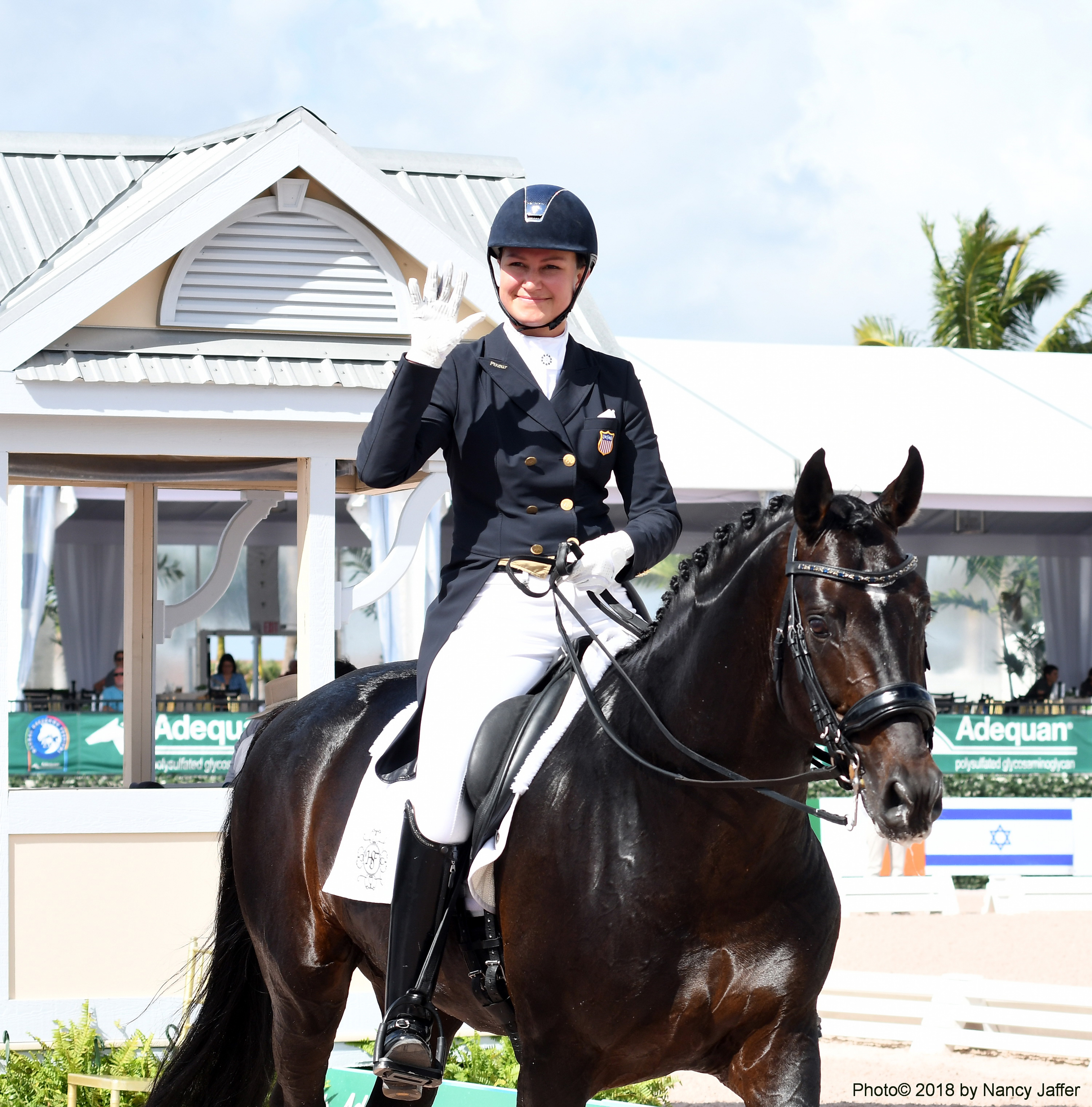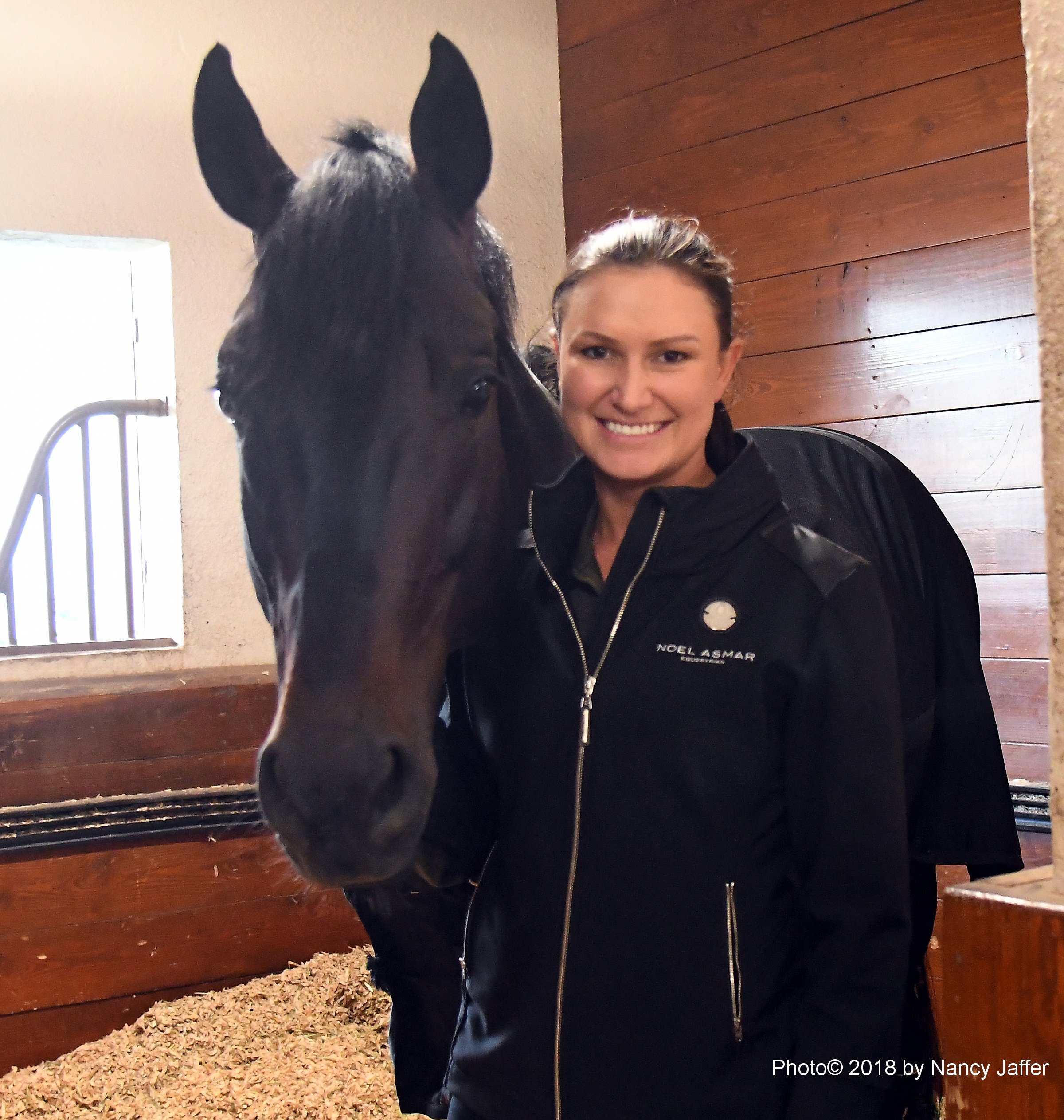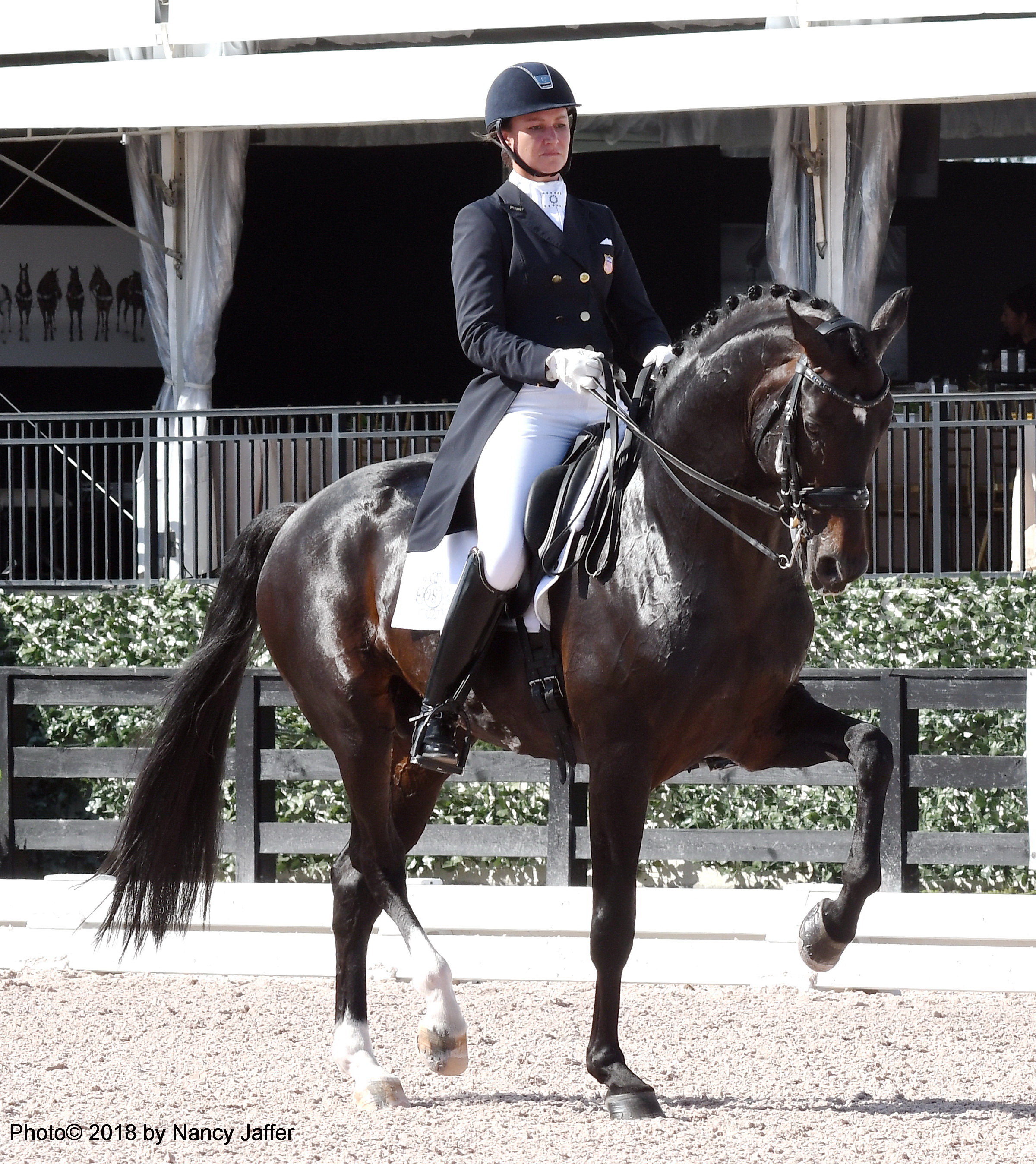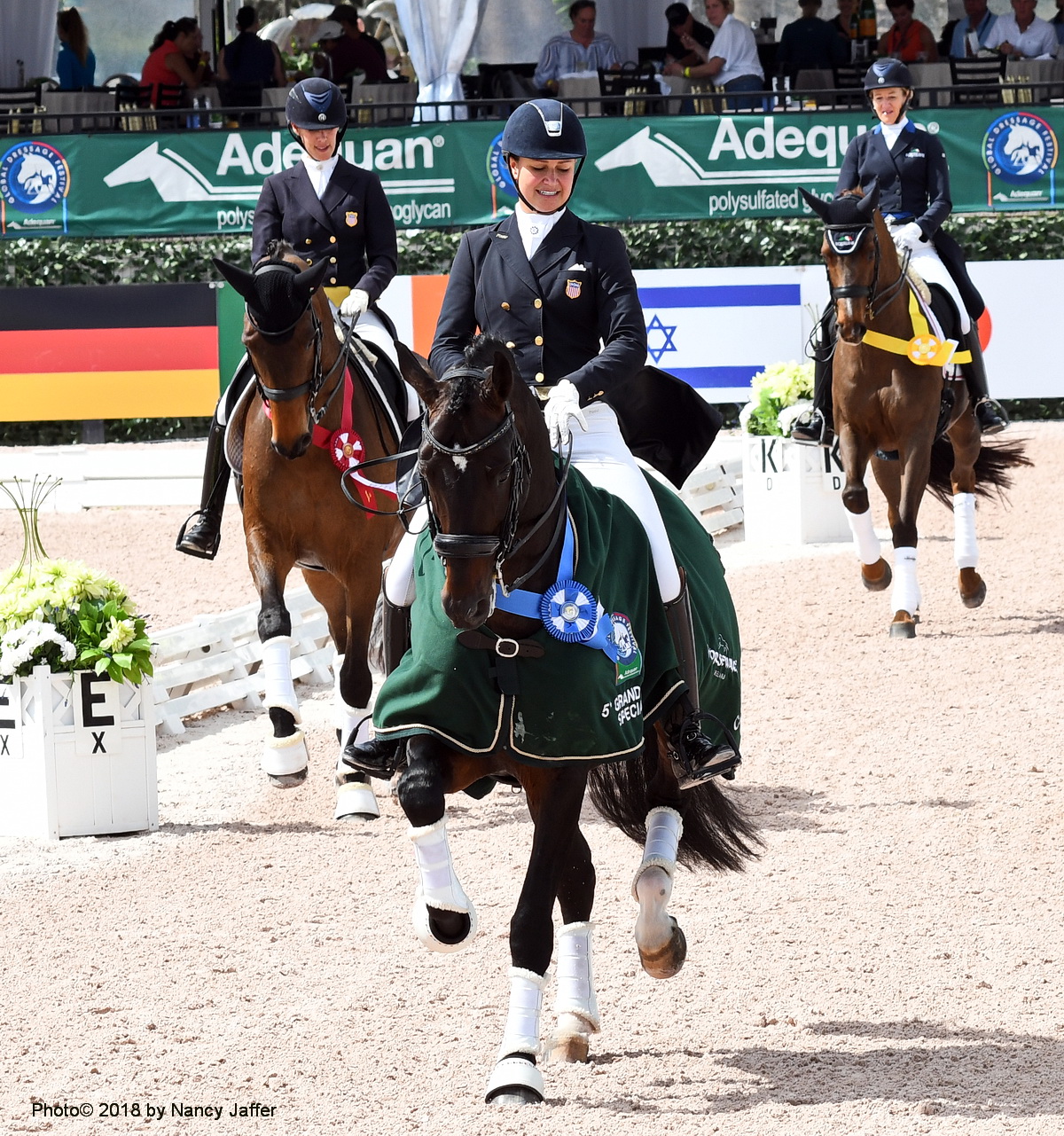Editor’s Note: This story was originally published in 2018. We thought it appropriate to share in honor of Salvino’s retirement, announced April 4, 2024.
Thomas Edison once observed, “Everything comes to him who hustles while he waits.” Change the gender in that phrase and it certainly rings true for Adrienne Lyle, about whom one also could apply the saying, “patience makes perfect.”
As the Adequan Global Dressage Festival in Wellington, Florida, drew to a close at the end of March, Lyle won the final Friday Night Lights Freestyle on Salvino with a mark of 81.75 percent. It was the first time in her career that she had broken 80 percent.

Boosted by her spectacular victory, as of March 31 Lyle and Salvino moved up the FEI ranking list to 19th, which, at the time, was the best ranking of her career. Lyle became one of only two American riders in the top 20, standing behind Laura Graves, No. 5 with Verdades. Although Lyle graduated from 27th place in February and 56th in January, her achievement was even more impressive when looking at the big picture, since she was No. 501 at the end of March 2017. As of August 2018, she was ranked 18th.
Returning to the Top

For Lyle, it has been an amazing journey from nowhere back to the top of the game. After competing in the 2012 Olympics on Wizard when she was only 27 years old and then the FEI World Equestrian Games (WEG) two years later, Lyle vanished from the Grand Prix arena and the global rankings list—as well as public attention—once her mount retired in ceremonies during the 2015 Las Vegas World Cup Finals. Her last show with Wizard was the WEG in August 2014. Lyle’s CDI reappearance wasn’t until 2017.
After it had become clear that Wizard’s career was ending, Lyle spent months looking for a horse who could be her next big star. It took four trips to Europe, but in May 2015, Lyle finally found her candidate in Sandronnerhall, as he originally was called before being rechristened Salvino, a name that was easier to handle. It would not be until nearly two years later, however, that the Hanoverian stallion (Sandro Hit X Donnerhall) would make his international Grand Prix debut with her.
Lyle and her mentor, USEF Development Coach Debbie McDonald, located the dream horse in Spain, where he showed the potential for which they had been searching. “When I saw him the first time, I thought to myself, He is very special. I loved his scope, power and suppleness,’’ Lyle recalled about the prospect, who had earned 80-plus percent marks in the 6-year-old competition with Spanish rider Antonio Diaz Porras in the saddle. On the second day that McDonald watched Lyle and the stallion together, she stated, “I think that’s your horse.” Then the work began.
“He wasn’t a baby. He was 8, older than what we’ve normally done, but you still have to make sure the basic control panel on a horse matches the way you ride,” explained Lyle, who has no interest in getting someone else’s made Grand Prix horse. “Even if they know the movements and the tricks, you have to take the time to make sure they really understand every single basic the way you want it,” she explained. “That takes a while. We spent a year pretty much doing that. Everything from simple transitions to half halts—everything every rider does slightly different—making sure he had a very clear understanding of what I wanted.”
While his own freestyle music was still in the development stages, Salvino performed his landmark kür to Wizard’s tunes, featuring “Dancing on the Ceiling” and “Soul Man.” It had been rechoreographed to match Salvino’s movement and presented a high degree of difficulty. Despite borrowing Wizard’s music, Salvino is quite different from his “temperamental and emotional” predecessor.
“Salvino is such a sweet horse, very people-oriented,” said Lyle, who enjoys giving him banana treats and taking him out to graze in the afternoons. “He’s had a good chance to bond with me and knows I’m his person,” she reported.


Support for Salvino
The late Parry Thomas and his wife, Peggy, who owned Wizard and McDonald’s great champion, Brentina, were out of the sponsorship game when Lyle and McDonald discovered Salvino, so other backers had to be found.
The group that came forward included Akiko Yamazaki (Steffen Peters’ sponsor); U.S. Equestrian Team Foundation Secretary Betsy Juliano; Bruce Hlavacek, who has served as chairman of the Dressage Owners Task Force and his wife, Jen; as well as a longtime friend of McDonald, Elma Garcia-Cannavino and her husband, Jim Cannavino. It was quite different for Lyle to report to a number of sponsors rather than simply connect with the Thomases as she did for years, but she is as diligent about that responsibility as she is about everything else she does. People get into a syndicate to “feel like part of the game and part of the program. Keeping them involved in the day-to-day training, your plans, your showing—all the little things—so they feel they’re a part of it, is very important,” Lyle observed.
She sent weekly updates, included photos from her phone when out on the trail, forwarded video clips and got together with backers to address big plans and goals. Along the way, she filled them in on big achievements with such bulletins as, “Today we got five one-tempis.”
Everyone was eager to see Salvino in the competition arena, but luckily, the syndicate members understood it would take time before he could make a public appearance if his training and conditioning were to be appropriate for their goals: the 2018 WEG and the 2020 Olympics.
Worth the Wait
Lyle and McDonald realized they couldn’t push the stallion. His conformation alone spoke to how he should be handled. “He has so much talent and is a very lanky horse,” explained McDonald. “The way he wants to move, the way his technique is in piaffe and passage, it requires so much strength that I think if you went out too soon on that, it would go quite south. He would say, ‘This isn’t so fun or so easy.’ Adrienne and I were on the same page. We felt it was going to be worth taking the time and getting him really strong and then bringing him out.”
As Lyle observed, “Sometimes it’s almost simpler when you have a baby because they don’t know as much. There’s less language you two have to learn from each other when they only know a couple of words. But when you’re a little more fluent in it, it takes a while to find your common language.”
There was another factor in the case of Salvino. “He’s such a big, powerful, scopey horse with such a range of motion that it took him a long time to get his strength,” Lyle explained. “He could give you a step or two of brilliance, but then he’d fall out of it and lose his balance. That was probably our biggest struggle, getting him to understand what we wanted so he could produce it, and then giving him time to build his strength to be able to produce it consistently and not get tired or frustrated or feeling like he’s in over his head.” She worked on self-carriage and balance with him. It took lots of transitions “and making sure he was listening to the smallest aid from me so I’m not having to push him or hold him up.”
By the time she competed in her first CDI with Salvino as the 2017 Adequan Global Dressage Festival drew to an end, Lyle said, “We were still kind of figuring each other out. The balance and the self-carriage and frame were not where we knew they were going to be when he’s finished. But he got in and handled the environment really well. Then spending the summer in Europe was great because you’re surrounded by top riders and horses.”
The USEF’s 2017 trip abroad involved competition in several of the world’s most celebrated shows, including Aachen, where Lyle was on the silver- medal team and finished ninth in the Special with Salvino. The dream was coming true.
She attributed a great deal of that success to the fact that “we did take our time in the beginning and didn’t put him in the ring and overface him,” she said, noting that now his confidence grows each time he steps into the arena.
A Look Toward the Future
In late July, Lyle and Salvino were officially selected as one of the four athlete-and-horse combinations of The Dutta Corp. U.S. Dressage Team for WEG. If everything goes to plan, she’s looking forward to riding for the world championship and Olympic qualification in her own country. “I think it’s really exciting. It’s way easier, because [in 2014] the Europeans had the advantage of hauling to the WEG while we were flying across the ocean. It will be nice to have it the other way around for once,” Lyle pointed out.
While Salvino is the only one of Lyle’s rides who was earmarked as a WEG potential competitor this time around, she has several other horses she is developing. One is Horizon, an Oldenburg mare owned by Juliano who graduated from Small Tour to Grand Prix in the winter season. Harmony’s Duval, a Dutch Warmblood owned by Duval Partners LLC, won with Lyle at Intermediate II in the national show during the Florida season. If things go as hoped, it’s possible all three horses could be candidates for the 2020 Olympics in Tokyo.
But for now, the focus is on Salvino. In January, Juliano bought out the other syndicate members who had purchased the stallion. “It all worked out really well,” said Lyle. “I wouldn’t be here with him if it hadn’t been for all the people who did originally step up. I’m so thankful for Akiko and all the syndicate members,” she said.
Discussing the sale, Lyle explained, “I think it’s a natural progression. The original group of owners are all based on the West Coast [while Salvino is based in the East] and their goal was to obtain a horse for me to be a team prospect. I think they all feel like they accomplished that goal and Betsy had time to think about it and make it work to where she was able to become the sole owner.”
Juliano is hands on, watching the schooling and standing ringside with McDonald for every competition. Her enthusiasm, win or lose, is encouraging. “I’m thrilled for Betsy. She gets to see him every day and be a part of it. She’s an owner who loves the process, like Parry did,” Lyle observed. Juliano became familiar with McDonald’s methods when the trainer and Lyle brought several horses to her stable in Wellington six years ago and she noticed Lyle’s “cool grace under pressure.” As for Salvino’s progress, Juliano noted, “We’re not at the end of the road by any means. There’s a lot more learning to come. I’m really, really excited about the potential.” (Read more about Betsy Juliano here.)
Lyle wasn’t sure what to expect with Salvino because he was her first stallion, but he doesn’t flaunt it. “He’s pretty calm, cool and collected most of the time. He’s very people-oriented, he looks to you for confidence. He thinks things through rather than reacting to them,” Lyle pointed out.
Asked about the methodology of how she and McDonald collaborate on the training of Salvino and the other horses, Lyle said, “We’re very similar. We both have the same philosophy: The most important thing is that the horse comes first. Their welfare comes first. They need a clear understanding of what you’re asking before you put any pressure on them. If the training goes well, that will come out in the showing.” That means trail rides and cross-training, such as cavalletti exercises, are part of the routine. The idea is to make everything fun for the horses, “so they don’t feel it’s just boring drilling in the arena,” Lyle explained.
McDonald is overjoyed at how well Lyle and Salvino have clicked. “Every time I watch them,” she said, “their absolute partnership is inspiring and makes me almost come to tears.”
Adrienne Lyle’s Unique Background
While Adrienne Lyle fit right in last year when she rode at Aachen, the most celebrated dressage venue in the world, her roots are in a very different type of equestrian scene. She grew up riding Western and bareback at her family’s cattle ranch on Whidbey Island, Washington, never taking a formal lesson until she joined the U.S. Pony Club when she was 9 years old. For her first Pony Club dressage lesson, she arrived in a Western saddle on a $200 pony named Salsa. Moving on to Pony Club games and eventing, Lyle honed her abilities and as a teenager, started training her own horses. Then she began a little business bringing along mounts for clients, doing all the mucking and grooming herself, along with the bookkeeping. It was a good introduction to developing the collection of skills necessary for the horse business that would become her life.
Even as her eventing involvement progressed, though, Lyle found herself fascinated by the discipline’s dressage element. “I’d get problem horses and spend so much time in dressage work that when I finally put a jump in front of them, it wasn’t a big deal anymore,” she says. “I just loved the training process.” She started to increase her involvement with dressage in 1998 when she was 13.
McDonald first saw the woman who was to become her protégée at her longtime base, the Thomas family’s River Grove Farm in Idaho. Lyle was riding Miguel, a horse she finished to Grand Prix and was part of the Region 6 bronze-medal team at the 2004 North American Young Riders Championships. McDonald was impressed by the earnest college student who trailered in for lessons. “She rode with so much feel, amazing timing and compassion for the horse. All these qualities are what I want to see in a rider,” said McDonald, who wasted no time in taking her on as a working student.
As it happened, McDonald was planning to retire from competition after the 2008 Olympics in Hong Kong and was looking for someone who could work full-time and do the riding and some of the training. Lyle began riding Wizard while McDonald was on the other side of the world for the Olympics. “I knew she had what it takes to be a top rider,” said McDonald, citing Lyle’s “nerves of steel” and her impeccable technique. “Not only is she an amazing rider, her teaching is just as amazing,” McDonald observed. Lyle’s initial job evolved into an assistant trainer position and then a partnership in River Grove Equestrian LLC with McDonald, who treats her like a daughter. After Parry Thomas passed away and his farm was sold, McDonald and her husband, Bob, began what is a work in progress, helping Lyle set up her own business near Sun Valley. Lyle loves hiking and camping in Idaho’s mountains, but this year, she stayed on in Florida after the circuit in Wellington, instead of heading west for the summer. She lives in a small bedroom at the barn where the River Grove operation is based in the Sunshine State. Lyle was pointing toward a trip to Europe with other U.S. riders, honing skills at major shows there. It was an approach designed to make the American team more competitive when it returned home to compete at September’s WEG in Tryon, North Carolina.



